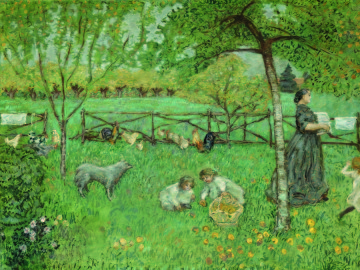
Originally Published in the Marina Times San Francisco in March 2016
“One always talks of surrendering to nature. There is also such a thing as surrendering to the picture” -Pierre Bonnard
Through May 15, the Fine Arts Museums of San Francisco presents the first major international presentation of Pierre Bonnard’s work in nearly a half a century.
More than seventy works that span his entire career will be on view. Living in the worlds between expressionism and abstraction, Bonnard was idiosyncratic and defied easy categorization in his approach to subject matter and technique. He studied at the Academie Julian in Paris where he was a student and follower of Paul Gauguin. Gauguin inspired a group of young painters called Les Nabis (after the word Nabi, which means prophet). Their painterly, abstract approach to color was meant to revitalize art. Never long affiliated with a single school or style, Bonnard worked in multiple genres and techniquies and was inspired by art from other cultures such as Japanese woodblock prints and Mediterranean mosaics. Unlike many of his contemporaries, Bonnard often painted from memory rather than life. After sketching scenes and making lengthy notes about color, he returned to his studio not to so much recreate what he’d seen, but rather to allow time to transform images from precise recollections into dreamlike memory.
Many of PIerre Bonnard’s most well-known paintings will be on view including “The Work Table”. Flat fields of bright colors defined his domestic interior paintings where color acts as an end to itself instead of a means to communicate space or proportion. The delightful series “Women in the Garden” will also be featured in this exhibit. The bright, abstract and decorative patterns reminiscent of Japanese art are closely related to other contemporary Post Impressionist stylings. These were originally conceived as four panels of a folding screen, but the artist ultimately preferred the compositions to be viewed separately. “Almond Tree In Bloom”, a small, intimate work painted at the end of the artist’s life shows a tree shining with color in mid day light.
“Bonnard’s arcadia is filled with poetry, wit, color and warmth” said Esther Bell, curator in charge of European paintings. “This selection of highlights from his career will make clear the artist’s important role in the history of French Modernism.”
Arcadia, in the context of this exhibit, means “a beautiful place”. Arcadia is also in a sense unattainable beauty, the moments that don’t last. Pierre Bonnard said “A painting that is well composed is half finished.” Unpredictable, fleeting moments accumulate and become the narrative of time: never lasting, but how bright and spectacular those moments can be.